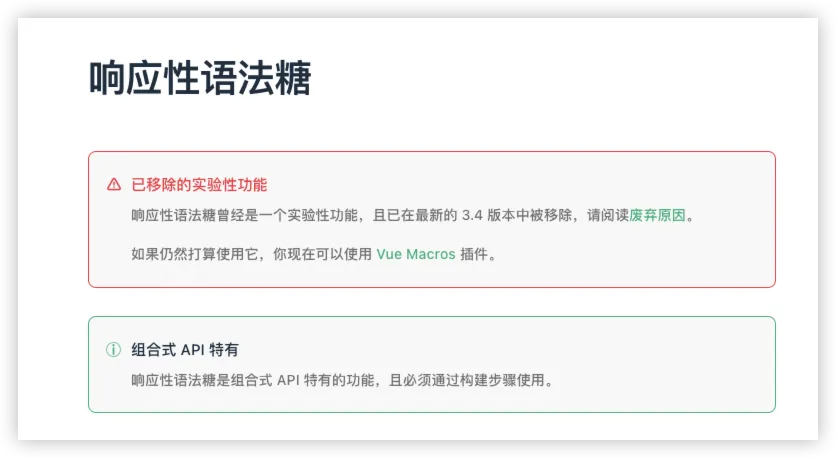自从引入组合式 API 的概念以来,一个主要的未解决的问题就是 ref 和响应式对象到底用哪个。
响应式对象存在解构丢失响应性的问题,而 ref 需要到处使用 .value 则感觉很繁琐,并且在没有类型系统的帮助时很容易漏掉 .value

2e8b084ed6e50cb5502a5d78669d8950.png
写法优化
以上是官方原话。大概就是新的语法糖 可以让我们更方便的使用ref,而不用每次都写.value
大概就是把这样的代码,简化成这样
1<script setup lang="ts">
2import { ref } from 'vue'
3
4const count = ref(0)
5console.log(count.value)
6const increment = ()=> {
7 count.value++
8}
9</script>
10
11<template>
12 <button @click="increment">{{ count }}</button>
13</template>
简化成
1<script setup lang="ts">
2const count = $ref(0)
3console.log(count.value)
4const increment = ()=> {
5 count++
6}
7</script>
8
9<template>
10 <button @click="increment">{{ count }}</button>
11</template>
每一个会返回 ref 的响应式 API 都有一个相对应的、以 $ 为前缀的宏函数。
11. ref -> $ref
22. computed -> $computed
33. shallowRef -> $shallowRef
44. customRef -> $customRef
55. toRef -> $toRef
怎么开启此功能
在vite中启用语法糖开关
打开vite.config.ts,添加如下代码
1vue({reactivityTransform: true})
配置tsconfig.json(可选)
在compilerOptions下添加vue/ref-macros
不然会报错`TS2304: Cannot find name ‘$ref’
虽然不影响使用,但是会影响开发体验
1"compilerOptions":{
2 "types": ["vue/ref-macros"]
3}
配置eslint(可选)
在eslintrc.cjs中加上global
不然会提示ESLint: '$ref' is not defined.(no-undef)
1module.exports = {
2 globals: {
3 $ref: "readonly",
4 $computed: "readonly",
5 $shallowRef: "readonly",
6 $customRef: "readonly",
7 $toRef: "readonly"
8 }
9};
免配上边两个可选
如果不嫌麻烦,又不想代码中总是有误报错误的行为。
可以直接在vue代码中引入vue/ref-macros。
这样就不用配置tsconfig.json和eslint了
1<script setup lang="ts">
2import { $ref } from "vue/macros";
3
4const count = $ref(0)
5console.log(count.value)
6const increment = ()=> {
7 count++
8}
9</script>
10
11<template>
12 <button @click="increment">{{ count }}</button>
13</template>
个人笔记记录 2021 ~ 2025